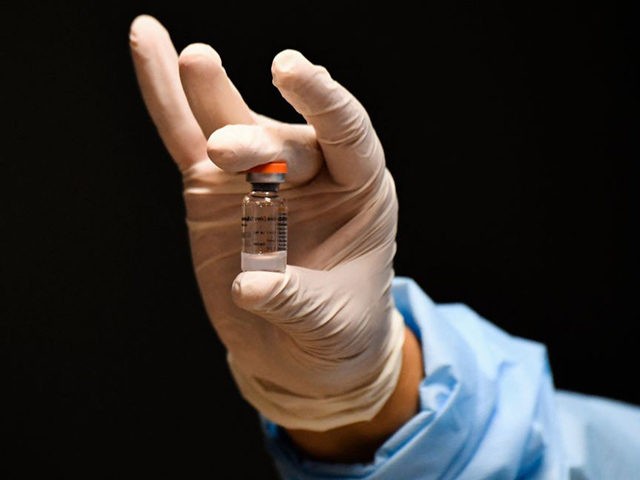The CEO of Sinovac Biotech, which developed China’s first Chinese coronavirus vaccine, claimed in an interview published Monday that the vaccine is “80-90 percent” effective within two months of receiving two doses.
The vaccine, formally known as “Coronavac,” tested to be only 50.38-percent effective against the Chinese coronavirus in clinical tests in Brazil, whose Butantan Institute agreed to conduct trials alongside Sinovac. Those results were the product of late-stage testing revealed in late January. The CEO of Sinovac, Yin Weidong, did not elaborate on which trials yielded the alleged 90-percent effectiveness rate or when those results are from.
“Coronavac” is in widespread distribution globally, one of the most popular options states with access to vaccines are choosing. Several heads of state, including Turkish President Recep Tayyip Erdogan and Indonesian President Joko Widodo, have received doses of Coronavac on live television as a way to inspire trust in the product. Notably absent from this list of world leaders is the dictator of China and leader of China’s Communist Party, Xi Jinping.
In addition to scrutiny based on its poor testing results in Brazil, “Coronavac” is facing heightened scrutiny in Hong Kong, where authorities began administering the vaccine product to elderly and vulnerable residents last week. At least three people have died shortly after taking the vaccine, prompting widespread skepticism in the formerly autonomous city.
“Current figures show that the protection rate of Sinovac vaccines within two months after administering two shots is 80-90 percent, but the number of antibodies in recipients declines with time,” Yin, the Sinovac chief, claimed in an interview with the Global Times, a Chinese state propaganda outlet. He teased that “some results” would be out on further testing “soon,” specifically on the vaccine’s efficacy rate in the long-term, after at least six months of the last dose. Yin suggested the vaccine may require three doses to be fully effective, which would make it unique among the top coronavirus vaccine candidates around the world.
Yin did not specify what test results he was touting that showed Coronavac to be between 80 and 90 percent effective. The most recent test results appear to be from a Turkish study published last week. The Turkish study found that the vaccine was about 83 percent effective in preventing infection. The oldest subjects in that study were age 59.
The stark difference between the Brazilian and Turkish test results appears to be the product of not having uniform standards of testing, Japan’s Nikkei Asian Review noted.
“Unlike global pharmaceutical companies’ centralized clinical trial protocols, Chinese vaccine producers left the clinical trial protocol setting to each applier country’s discretion,” Ali Yagiz Uresin, a professor at Istanbul University’s Istanbul Faculty of Medicine, told Nikkei. The results were thus “very different scopes, volunteer profiles and case definitions, which caused very different clinical trial results in different countries, confusing public opinion.”
Uresin speculated that the reason the vaccine was so much more effective in Turkey is that the Brazilian subjects were all health workers constantly exposed to the virus at work, while the Turkish subjects were in a variety of fields and varied in their exposure to coronavirus.
Yin also addressed concerns that “Coronavac” may not be safe, particularly for elderly patients.
“We have collected enough data to prove our vaccine’s safety on the senior people and our vaccine is allowed to be used on the group pending emergency use approval. The exclusion of the older demographic from vaccination coverage is based on the consideration of the pandemic situation rather than the safety of the vaccine,” Yin told the state newspaper. He noted Sinovac had “basically completed” Phase II clinical trials on older patients, meaning the company has not yet begun the last phase of trials, Phase III, the completion of which is typically an industry standard before mass distribution.
Yin boasted that Pelé, the legendary Brazilian soccer player, had received a dose of Coronavac at age 80, urging others to trust the vaccine.
Concerns about Coronavac’s safety when used on senior citizens have escalated in light of several incidents in Hong Kong, which began distributing the product last week. Authorities confirmed the death of a 63-year-old man on Sunday after his first dose of Coronavac. By Monday, the death toll in Hong Kong among elder persons had risen to three people: a 55-year-old woman and a 71-year-old man. At least two others are facing serious medical complications after receiving their first doses, according to local media.
The incidents have prompted a sharp decline in demand for the vaccine in the city. In January, a poll showed that only about 30 percent of Hong Kong residents trusted the Sinovac product and 46 percent were interested in a coronavirus vaccine in general, when not asked about which product. Distrust of Chinese vaccines appears also prevalent in China. In Zhejiang province, a poll published in February found that less than half of the province’s health workers were open to taking a Chinese-made coronavirus vaccine.

COMMENTS
Please let us know if you're having issues with commenting.